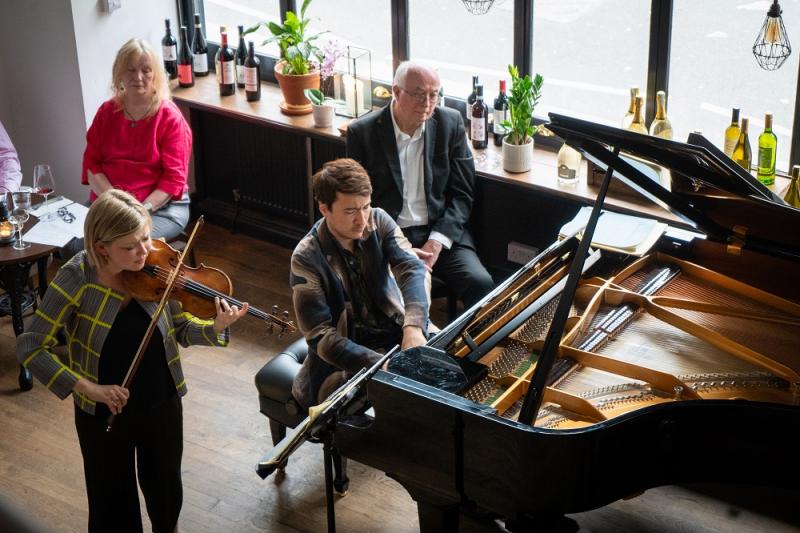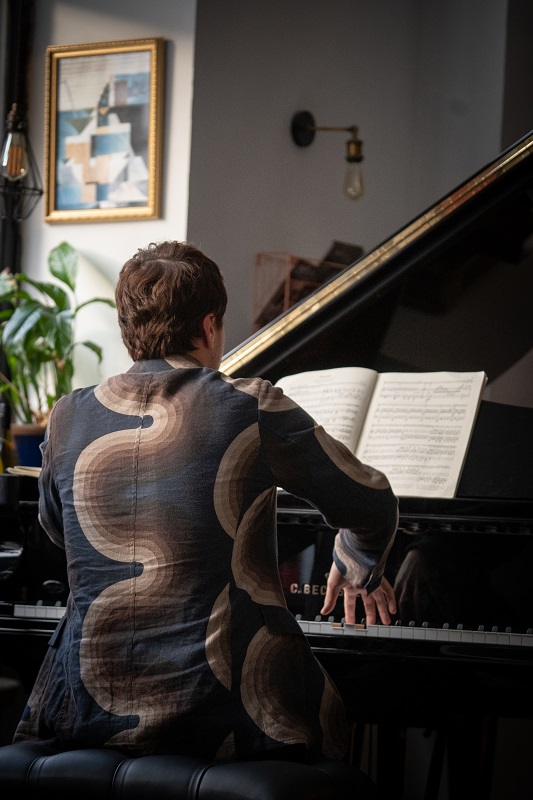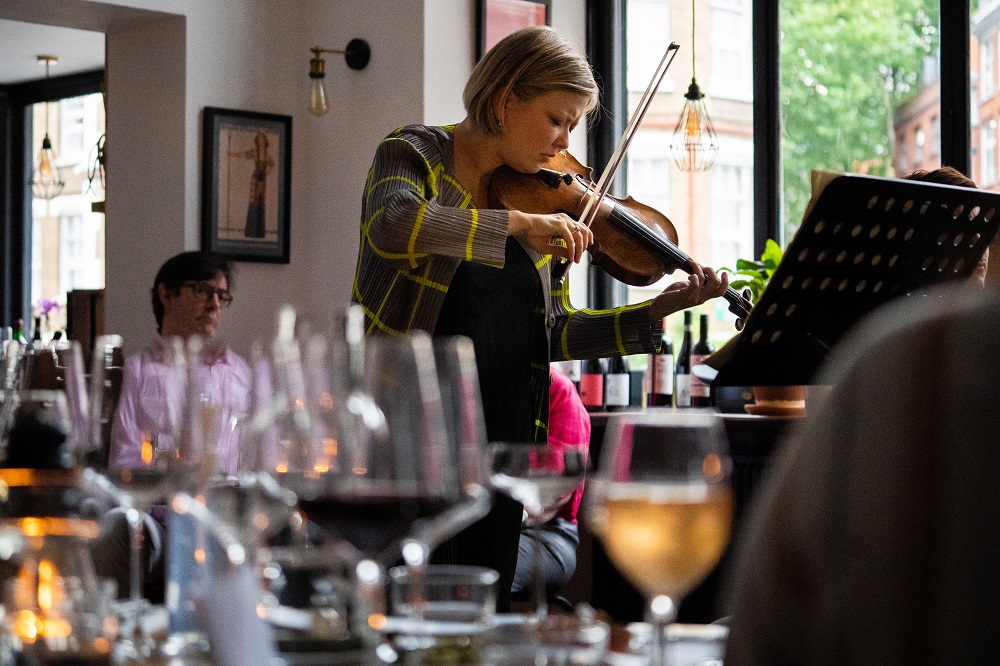Alina Ibragimova, Samson Tsoy, Fidelio Orchestra Café review – cataclysms and calm on the Clerkenwell Road | reviews, news & interviews
Alina Ibragimova, Samson Tsoy, Fidelio Orchestra Café review – cataclysms and calm on the Clerkenwell Road
Alina Ibragimova, Samson Tsoy, Fidelio Orchestra Café review – cataclysms and calm on the Clerkenwell Road
Febrile Beethoven and Janáček, unadvertised profundity from Pärt and Messiaen

The Fidelio Orchestra Café is where you go for electric-shock and deep immersion therapy from the greatest of musicians.
 That the sonatas were loud at times in the café space can’t be denied. But it would have been a mistake for performers as vivid as these to scale down: you don’t ask for a dimmer switch on the sun. And in any case even Tsoy’s playing at its most massive is well weighted and focused in Russian piano-school style. The shocks and buffets were essential to music that’s anything but comfortable. Janáček in the fateful summer of 1914 veers between tender lyricism, unease and brute force in a way that anticipates the circumscribed world of Katya Kabanova, four years in the future; even some of the themes are similar, especially the rough folk dance of the scherzo.
That the sonatas were loud at times in the café space can’t be denied. But it would have been a mistake for performers as vivid as these to scale down: you don’t ask for a dimmer switch on the sun. And in any case even Tsoy’s playing at its most massive is well weighted and focused in Russian piano-school style. The shocks and buffets were essential to music that’s anything but comfortable. Janáček in the fateful summer of 1914 veers between tender lyricism, unease and brute force in a way that anticipates the circumscribed world of Katya Kabanova, four years in the future; even some of the themes are similar, especially the rough folk dance of the scherzo.
When violinist and pianist hit the stratosphere, as Janacek several times asks them to do – Katya, as it were, takes flight – you wondered if the glasses would shatter. Those literal heights were reached again in each of the other works. The first coup of Ibragimova and Tsoy, in a fairly late decision, was to place Pärt’s metaphysical Spiegel im Spiegel (Mirror in the Mirror) between the frenzied activity of Janáček and Beethoven. It didn’t matter in the least that the traffic sometimes roared outside the windows on the Farringdon Road; when players go inside themselves like this, you go with them. Britten’s magic triangle of composer, musicians and audience was at its most luminous here, a second reminder for those of us lucky enough to be in the venue two weeks running of what we and the artists had been missing.
A live charge is surely essential for Beethoven’s “Kreutzer” Sonata, too. While the central variations were the only interlude of the evening in terms of relaxation – though here, too, Ibragimova and Tsoy took us high into unknown regions – it wasn’t just the restless first movement, taking off from authoritatively mysterious piano chords, which proved demonic (you feared that Ibragimova’s astounding pizzicati would break the strings). The tarantella finale was a dash at the most audacious speed – and with near-perfect synchonicity – through hellfire, the players just about living to tell the next tale.  Which was active heaven in the form of “Praise to the immortality of Jesus” (it sounds better in French), the final movement of Messiaen’s Quartet for the End of Time, Ibragimova turning on such intensity in the heights that you came to believe in the reality of the imprisoned Messiaen’s searing 1941 vision. Afterwards, there was wonderful food again, from Alan Rosenthal, and the normality of conversation. But that glimpse of God was truly seared into the soul, even if the earworm you took away was Beethoven’s tarantella. Hard to believe that Ibragimova and Tsoy can repeat such a fierce programme over the four nights to come, but music always gives more life and energy than it takes.
Which was active heaven in the form of “Praise to the immortality of Jesus” (it sounds better in French), the final movement of Messiaen’s Quartet for the End of Time, Ibragimova turning on such intensity in the heights that you came to believe in the reality of the imprisoned Messiaen’s searing 1941 vision. Afterwards, there was wonderful food again, from Alan Rosenthal, and the normality of conversation. But that glimpse of God was truly seared into the soul, even if the earworm you took away was Beethoven’s tarantella. Hard to believe that Ibragimova and Tsoy can repeat such a fierce programme over the four nights to come, but music always gives more life and energy than it takes.
rating
Explore topics
Share this article
The future of Arts Journalism
You can stop theartsdesk.com closing!
We urgently need financing to survive. Our fundraising drive has thus far raised £49,000 but we need to reach £100,000 or we will be forced to close. Please contribute here: https://gofund.me/c3f6033d
And if you can forward this information to anyone who might assist, we’d be grateful.

Subscribe to theartsdesk.com
Thank you for continuing to read our work on theartsdesk.com. For unlimited access to every article in its entirety, including our archive of more than 15,000 pieces, we're asking for £5 per month or £40 per year. We feel it's a very good deal, and hope you do too.
To take a subscription now simply click here.
And if you're looking for that extra gift for a friend or family member, why not treat them to a theartsdesk.com gift subscription?
more Classical music
 Bizet in 150th anniversary year: rich and rare French offerings from Palazzetto Bru Zane
Specialists in French romantic music unveil a treasure trove both live and on disc
Bizet in 150th anniversary year: rich and rare French offerings from Palazzetto Bru Zane
Specialists in French romantic music unveil a treasure trove both live and on disc
 Scottish Chamber Orchestra, Ibragimova, Queen’s Hall, Edinburgh review - rarities, novelties and drumrolls
A pity the SCO didn't pick a better showcase for a shining guest artist
Scottish Chamber Orchestra, Ibragimova, Queen’s Hall, Edinburgh review - rarities, novelties and drumrolls
A pity the SCO didn't pick a better showcase for a shining guest artist
 Kilsby, Parkes, Sinfonia of London, Wilson, Barbican review - string things zing and sing in expert hands
British masterpieces for strings plus other-worldly tenor and horn - and a muscular rarity
Kilsby, Parkes, Sinfonia of London, Wilson, Barbican review - string things zing and sing in expert hands
British masterpieces for strings plus other-worldly tenor and horn - and a muscular rarity
 From Historical to Hip-Hop, Classically Black Music Festival, Kings Place review - a cluster of impressive stars for the future
From quasi-Mozartian elegance to the gritty humour of a kitchen inspection
From Historical to Hip-Hop, Classically Black Music Festival, Kings Place review - a cluster of impressive stars for the future
From quasi-Mozartian elegance to the gritty humour of a kitchen inspection
 Shibe, LSO, Adès, Barbican review - gaudy and glorious new music alongside serene Sibelius
Adès’s passion makes persuasive case for the music he loves, both new and old
Shibe, LSO, Adès, Barbican review - gaudy and glorious new music alongside serene Sibelius
Adès’s passion makes persuasive case for the music he loves, both new and old
 Anja Mittermüller, Richard Fu, Wigmore Hall review - a glorious hall debut
The Austrian mezzo shines - at the age of 22
Anja Mittermüller, Richard Fu, Wigmore Hall review - a glorious hall debut
The Austrian mezzo shines - at the age of 22
 First Person: clarinettist Oliver Pashley on the new horizons of The Hermes Experiment's latest album
Compositions by members of this unusual quartet feature for the first time
First Person: clarinettist Oliver Pashley on the new horizons of The Hermes Experiment's latest album
Compositions by members of this unusual quartet feature for the first time
 Gesualdo Passione, Les Arts Florissants, Amala Dior Company, Barbican review - inspired collaboration excavates the music's humanity
At times it was like watching an anarchic religious procession
Gesualdo Passione, Les Arts Florissants, Amala Dior Company, Barbican review - inspired collaboration excavates the music's humanity
At times it was like watching an anarchic religious procession
 Classical CDs: Camels, concrete and cabaret
An influential American composer's 90th birthday box, plus British piano concertos and a father-and-son duo
Classical CDs: Camels, concrete and cabaret
An influential American composer's 90th birthday box, plus British piano concertos and a father-and-son duo
 Cockerham, Manchester Camerata, Sheen, Martin Harris Centre, Manchester review - re-enacting the dawn of modernism
Two UK premieres added to three miniatures from a seminal event of January 1914
Cockerham, Manchester Camerata, Sheen, Martin Harris Centre, Manchester review - re-enacting the dawn of modernism
Two UK premieres added to three miniatures from a seminal event of January 1914
 Kempf, Brno Philharmonic, Davies, Bridgewater Hall, Manchester review - European tradition meets American jazz
Bouncing Czechs enjoy their Gershwin and Brubeck alongside Janáček and Dvořák
Kempf, Brno Philharmonic, Davies, Bridgewater Hall, Manchester review - European tradition meets American jazz
Bouncing Czechs enjoy their Gershwin and Brubeck alongside Janáček and Dvořák
 Solomon, OAE, Butt, QEH review - daft Biblical whitewashing with great choruses
Even a top soprano and mezzo can’t make this Handel paean wholly convincing
Solomon, OAE, Butt, QEH review - daft Biblical whitewashing with great choruses
Even a top soprano and mezzo can’t make this Handel paean wholly convincing

Add comment